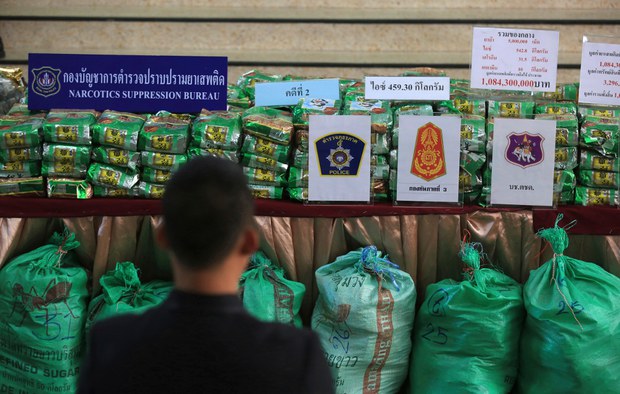UN Report: Organized Crime Has Grown Dramatically in Southeast Asia
2019.07.18
Washington
 A journalist views packages containing 459 kg (1,012 pounds) of crystal methamphetamine at the Narcotics Suppression Bureau in Bangkok, July 15, 2019
A journalist views packages containing 459 kg (1,012 pounds) of crystal methamphetamine at the Narcotics Suppression Bureau in Bangkok, July 15, 2019
Organized crime in Southeast Asia involving drugs, counterfeit goods and human trafficking wields unprecedented muscle, the United Nations said Thursday in a report calling on countries to cooperate in ridding the region of these underworld activities.
Lax law enforcement efforts in some parts of Southeast Asia have allowed organized crime groups to scale up operations in locations where there is weak governance, particularly border areas, the U.N.’s Office on Drugs and Crime (UNODC) found. In addition, the use of casinos by these organization to launder money presents a significant challenge, the agency said.
“While transnational organized crime syndicates use their financial muscle to further corrupt and undermine the rule of law, they are also destroying the lives of countless people in Southeast Asia. Aside from the direct effects – including drug use, sexual exploitation and environmental damage – organized crime groups in Southeast Asia launder considerable amounts of money through lightly or unregulated cash based industries like casinos,” the report said.
“As a result, transnational criminal groups now represent a primary threat to the public security, health and sustainable development of the region.”
In a news release accompanying the 194-page report, UNODC Regional Representative Jeremy Douglas said the study was the most comprehensive in more than five years.
“Southeast Asia has an organized crime problem and it is time to coalesce around solutions to address the conditions that have allowed illicit businesses to grow, and to secure and cooperate along borders,” Douglas said.
The synthetic drug trade has rapidly become the region’s most profitable business for organized crime, with the methamphetamine market valued at between U.S. $30.3 billion and $61.4 billion, according to the report.
To keep pace, syndicates have innovated their business model while expanding distribution. Methamphetamine, which is increasingly produced in northern Myanmar, is the drug of concern in Indonesia, Malaysia, the Philippines and Thailand, the report said.
“To meet and expand demand for methamphetamine in the region, transnational organized crime groups are trafficking staggering amounts of both methamphetamine tablets and crystalline methamphetamine to markets in East and Southeast Asia and, increasingly to other parts of the world,” the report states.
In addition, “Organized crime groups in Southeast Asia launder considerable amounts of money though lightly or unregulated cash-based industries like casinos,” it said, adding that the groups represent a primary threat to public security and regional development.
A Thai senator who had served as a deputy prime minister offered to work with other nations to combat transnational organized crime, the Bangkok Post reported.
“We are ready to take a leadership role and work with UNODC and international partners to build resilience and address cross-border trafficking,” Prajin Juntong said.
Human trafficking and counterfeit goods
The report confirms that the disparity between developed and least developed countries has created a demand for cheap labor, driving the growth in human trafficking and smuggling of migrants looking for work.
More than half of all smuggled migrants detected in Malaysia from 2013 to 2018 were Indonesian nationals, almost 28 percent were from Myanmar, 8.5 percent from Bangladesh and 6 percent from the Philippines.
Meanwhile, a factor making Southeast Asia vulnerable to counterfeit goods is its proximity to China, which has been identified as the world’s main source of such products. Malaysia and Thailand also place a significant role in the manufacture and repackaging of such goods for international markets, the report said.
Fake products including tobacco, auto parts, handbags and alcohol produced in the region are valued at $35.9 billion, according to the report, which pointed to another sector of products that are pulling a profit at a cost to consumers.
“Alarmingly, falsified medicines continue to proliferate and cause immediate health impacts for users while also changing patterns of disease, and they are generating as much as $2.6 billion per year,” UNODC said in its news release.
Regional efforts
The report supported regional efforts to ratify the U.N. Convention against Transnational Organized Crime, and it applauded the Association of Southeast Asian Nations for convening meetings among senior officials on transnational crimes and drug issues.
“However, there remain significant limitations due to the absence of a comprehensive regional strategy for transnational crime,” the report stated.
It called on national leaders to recognize the problems and establish strategies to combat organized crime.
“It is important that countries in the region not recognize transnational organized crime solely as a law enforcement matter, and that any strategy or strategies incorporate measures to address demand for illicit commodities and services,” it said.
The report called on the nations to establish a regional framework to monitor and regulate the casino industry to cut back on money laundering.
A casino junket operator who returned nearly $10 million of $81 million from the Bangladesh Central Bank in a 2016 cyber heist admitted to investigators that three men had used his casino to launder the money he returned.
The findings by UNODC also urged the countries to strengthen regional data collection and reporting along with cross-border exchange of information to help identify key trends and concerns while providing a foundation for developing evidence-based investigations.
“It is important that countries take steps to increase collaborative intelligence gathering, law enforcement operations and criminal justice responses. This should also include initiatives to support regional networks of law enforcement officials and financial intelligence units, and strengthened use of mutual legal assistance,” the report concluded.







